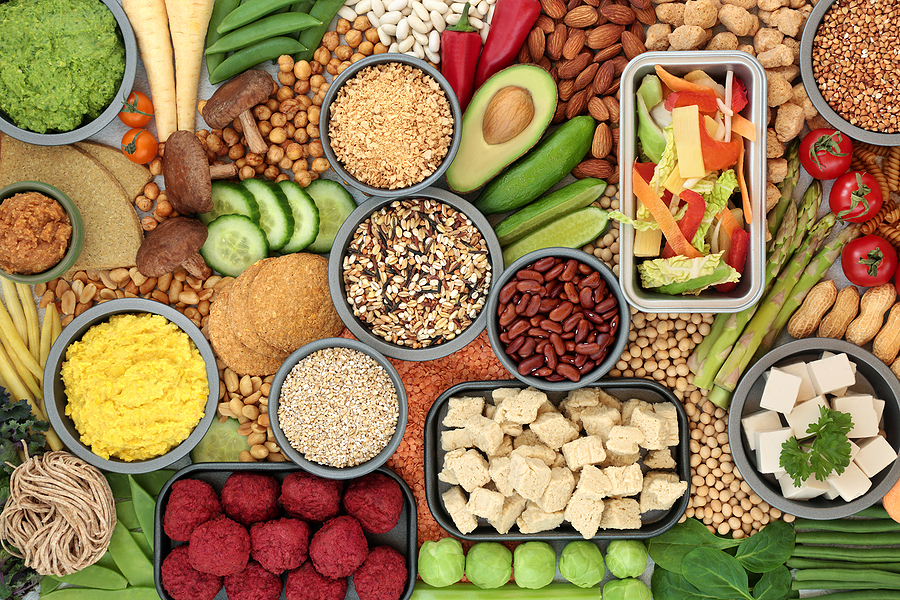Hidden Ingredients in Sugar Free Sauces: What to Watch Out For
Hidden Ingredients in Sugar Free Sauces: What to Watch Out For
Blog Article
Everything About Healthy Food: Benefits of Checking Out Plant Based Choices
The conversation surrounding plant-based diet regimens has obtained considerable attention in recent years. Several individuals are discovering the potential wellness advantages, dietary advantages, and environmental effects connected with these dietary options. As individuals end up being much more knowledgeable about their food's influence on wellness and sustainability, concerns develop about the functionalities of embracing such a lifestyle. What particular adjustments can one expect, and exactly how might these choices reshape not just individual health and wellness yet also the world's future?
Recognizing Plant-Based Diets
Lots of individuals connect plant-based diet plans mostly with vegetarianism or veganism, these diets can incorporate a large array of eating patterns that focus on entire, minimally processed plant foods. Such diets commonly include fruits, vegetables, whole grains, seeds, legumes, and nuts, while eliminating or limiting animal products. This flexibility permits people to tailor their dietary choices according to dietary requirements and personal preferences. Some might take on a mainly plant-based diet while still periodically consuming meat or milk, commonly referred to as a flexitarian method. The emphasis stays on integrating more plant foods, which can result in a varied array of meals and flavors. Recognizing these different interpretations of plant-based consuming is crucial for appreciating its availability and appeal in contemporary food society.
Health And Wellness Conveniences of Plant-Based Foods
The health advantages of plant-based foods are significant, offering a nutrient thickness advantage that sustains total well-being. Research study indicates that these foods can improve heart health and play a vital role in effective weight monitoring. By integrating more plant-based options, people may boost their dietary choices and advertise long-term wellness.
Nutrient Density Advantage
Nutrient thickness plays a crucial role in the health benefits of plant-based foods, making them a compelling choice for those seeking a well balanced diet regimen. Plant-based foods, such as fruits, vegetables, legumes, nuts, and whole grains, are usually rich in essential vitamins, minerals, and anti-oxidants while being lower in calories. This high nutrient thickness enables individuals to eat fewer calories while still satisfying their dietary needs. Additionally, these foods are loaded with nutritional fiber, advertising gastrointestinal wellness and assisting in weight administration. By incorporating nutrient-dense plant-based options, customers can enhance their total wellness, support their body immune systems, and lower the threat of persistent illness. Eventually, the nutrient density of plant-based foods highlights their value in a health-conscious way of life.
Heart Health And Wellness Improvement

Weight Management Assistance
Along with promoting heart health, a plant-based diet plan can considerably assist in weight administration. This dietary strategy emphasizes entire foods such as fruits, veggies, legumes, nuts, and entire grains, which are normally reduced in calories and greater in fiber compared to animal-based items. The high fiber material aids raise satiety, decreasing overall calorie consumption. Additionally, plant-based diets are often rich in necessary nutrients while reduced in harmful fats, making it easier to keep a healthy and balanced weight. Plant Based Chicken. Research study indicates that people who adopt a plant-based way of living often tend to have reduced body mass indexes (BMIs) and experience even more successful weight reduction compared to those that eat meat-heavy diet regimens. Embracing plant-based alternatives is a tactical choice for efficient weight management.
Nutritional Worth of Plant-Based Ingredients
Plant-based ingredients are abundant in vital nutrients, offering a diverse selection of vitamins, minerals, and antioxidants that add to general health. A comparison of healthy protein resources reveals that while animal items are usually checked out as remarkable, many plant-based options give adequate protein and other helpful substances. Recognizing the dietary worth of these active ingredients can aid people make informed dietary selections.
Vital Nutrients in Plants
Nutrient-rich components discovered in plants supply a diverse range of important nutrients that contribute substantially to total health and wellness. These components are abundant in vitamins A, C, and K, which support immune function, vision, and blood clot, respectively. In addition, plants give vital minerals such as potassium, magnesium, and calcium, important for heart wellness, muscle mass function, and bone toughness. The existence of fiber in plant-based foods aids digestion and promotes a healthy intestine microbiome. Antioxidants, discovered abundantly in vegetables and fruits, help battle oxidative tension and decrease swelling. Numerous plant foods are reduced in calories yet high in nutrients, making them an exceptional choice for those seeking to preserve a healthy weight while guaranteeing excellent nutrient consumption.

Comparing Healthy Protein Sources
Protein resources vary significantly in their dietary accounts, with plant-based ingredients using distinct advantages. Unlike animal proteins, which commonly consist of saturated fats and cholesterol, plant proteins have a tendency to be lower in these harmful parts. Legumes, nuts, seeds, and entire grains are rich in necessary amino acids, fiber, vitamins, and minerals. Lentils offer high protein content along with significant iron and folate, while quinoa is a complete protein, supplying all nine crucial amino acids. In addition, plant-based healthy proteins are usually come with by antioxidants and phytochemicals that sustain general wellness. The shift to plant-based healthy protein sources not just improves dietary consumption but additionally straightens with lasting dietary practices, decreasing ecological influence and promoting long-lasting health benefits.
Ecological Impact of Plant-Based Consuming
As recognition of climate adjustment expands, numerous people are exploring sustainable nutritional options that can greatly decrease their ecological footprint. Plant-based consuming has become a considerable factor to lowering greenhouse gas discharges, which are largely related to livestock manufacturing. the original source The cultivation of fruits, grains, vegetables, and veggies normally calls for fewer resources, such as water and land, compared to animal farming. Furthermore, plant-based diet plans can bring about lowered deforestation, as less land is required for grazing livestock or growing animal feed. By changing towards plant-based options, consumers can sustain biodiversity and advertise healthier environments. Overall, embracing plant-based consuming not only advantages individual health but likewise stands for an essential action towards environmental sustainability and conservation initiatives.
Conquering Common Misconceptions
While lots of individuals identify the benefits of a plant-based diet regimen, a number of mistaken beliefs frequently deter them from completely welcoming this way of life. A common belief is that plant-based diet regimens do not have adequate protein; nonetheless, numerous plant sources, such as beans, nuts, and tofu, provide ample protein. Furthermore, some think that this diet is costly, when in reality, staples like beans, rice, and seasonal veggies can be rather inexpensive. Another false impression is that plant-based consuming is overly limiting, whereas it actually provides a varied range of foods and tastes. Ultimately, numerous stress that a plant-based diet plan may lead to shortages, yet with correct planning, people can acquire all necessary right here nutrients, including minerals and vitamins, while enjoying a wide array of delicious meals.
Tips for Transitioning to a Plant-Based Way of living
Making the change to a plant-based way of life can be an enhancing Look At This experience, though it commonly calls for some advice to browse the first modifications. Initially, individuals are motivated to begin slowly, including more fruits, veggies, beans, and whole grains into their meals while minimizing meat and dairy products consumption. Meal preparation is important; preparing an once a week food selection can aid ease the adjustment and stop last-minute unhealthy choices. Discovering cooking methods and new recipes can likewise boost the experience and keep exhilaration about plant-based consuming. Additionally, joining assistance teams or neighborhoods can give inspiration and share valuable pointers. Finally, staying informed concerning nutrition assurances well balanced dishes, preventing deficiencies while promoting a healthy, enjoyable plant-based way of life.
Delicious Plant-Based Meal Ideas
Exploring tasty plant-based meal ideas can motivate people to welcome an extra healthy diet regimen. One popular alternative is a passionate quinoa salad, including cherry tomatoes, cucumber, and a zesty lemon-tahini clothing. An additional favorite is a tasty lentil stew, loaded with carrots, celery, and fragrant natural herbs, perfect for a soothing supper. For breakfast, overnight oats made with almond milk, chia seeds, and covered with fresh berries supply a nutritious begin to the day. In addition, a vivid vegetable stir-fry with tofu and a variety of vibrant veggies can be a fast yet satisfying meal. Finally, creamy avocado salute on whole-grain bread, sprinkled with spices and seeds, offers an easy yet tasty treat. These dishes display the selection and splendor of plant-based consuming.

Frequently Asked Concerns
Can a Plant-Based Diet Regimen Provide Enough Protein?
The question of whether a plant-based diet can provide sufficient healthy protein prevails. Many resources, including vegetables, nuts, seeds, and whole grains, can satisfy healthy protein needs successfully, supporting a nutritious and balanced diet plan for individuals.
Are Plant-Based Diet Plans Appropriate for Kid?
The viability of plant-based diet plans for kids depends on mindful planning. Adequate nutrients must be ensured, consisting of minerals, proteins, and vitamins. With correct guidance, such diet plans can sustain healthy development and advancement in kids.
Exactly how Do I Eat in restaurants on a Plant-Based Diet?
Eating in restaurants on a plant-based diet involves looking for restaurants with diverse menus, requesting for modifications, and checking out vegan-friendly choices. Planning in advance and connecting dietary choices can improve the eating experience while maintaining dietary selections.
What Prevail Allergens in Plant-Based Foods?
Typical irritants in plant-based foods consist of soy, gluten, nuts, and seeds - BBQ Sauces. Individuals adhering to a plant-based diet regimen needs to be mindful of these allergens and read tags thoroughly to stay clear of adverse responses and assure secure usage
Can Plant-Based Diets Help With Weight Loss?
Research study indicates that embracing a plant-based diet plan might facilitate weight management because of its usually reduced calorie density and greater fiber web content. This mix can enhance satiation, aiding people handle their caloric intake properly. Lots of individuals link plant-based diet plans primarily with vegetarianism or veganism, these diet regimens can incorporate a broad array of consuming patterns that prioritize entire, minimally processed plant foods. Nutrient density plays a necessary function in the health and wellness benefits of plant-based foods, making them a compelling choice for those looking for a well balanced diet. Plant-based diet plans have actually been revealed to significantly enhance heart wellness, as they usually have aspects that support cardiovascular function. In addition to advertising heart health, a plant-based diet regimen can substantially help in weight management. A common belief is that plant-based diet regimens lack sufficient healthy protein; nevertheless, countless plant resources, such as vegetables, nuts, and tofu, provide enough protein.
Report this page